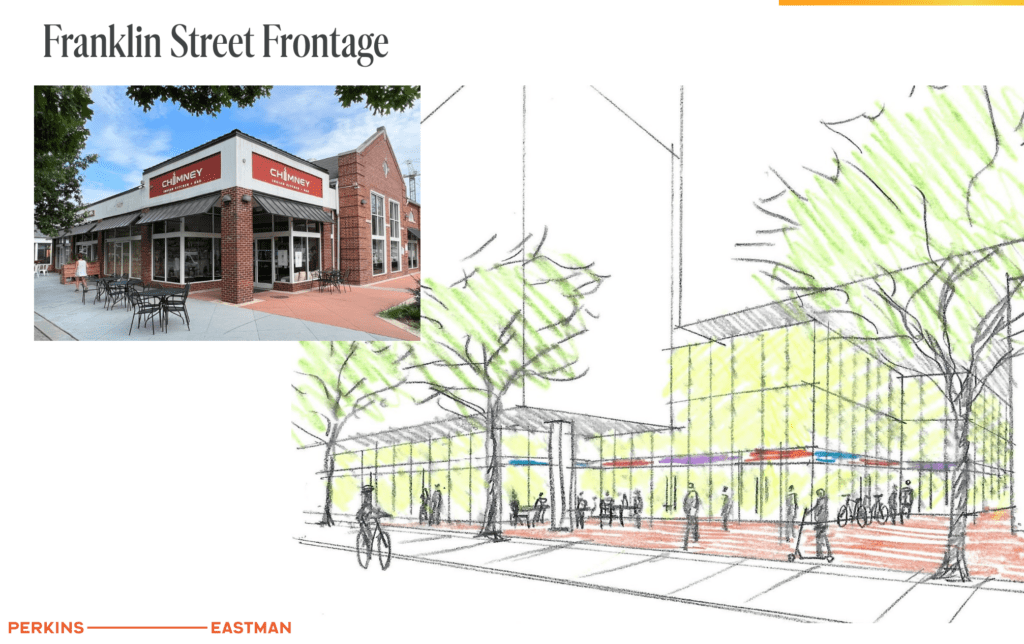
From the start of the March 22 meeting of Chapel Hill Town Council, it seemed that everyone was bracing for a long night. Despite a relatively slim agenda, the council revisited several contentious items from the past and discussed, for the first time, a wet lab that’s proposed for downtown. Here’s what we learned:
- People Still Love Purple Bowl, and No One Seems Interested in Compromise
As we’ve discussed previously, The Purple Bowl is a great restaurant with a bad lease, and barring a movie-like ending where capitalism falls and açaí bowls triumph, they’re going to be forced to move in the next two years. Fortunately, the town has negotiating power, there are an abundance of downtown real estate options for a beloved restaurant and gathering place, and the town is developing programs to help businesses relocate in situations like this.
But from last night’s meeting, both the developer (the biotech investor Longfellow, which is, as of last year, Purple Bowl’s landlord) and Purple Bowl seem to be more interested in talking past each other than communicating, something that several council members noted in their comments after an impassioned 45-minutes of commentary, mostly from UNC students. (Their comments included: “Throughout the course of history, great leaders have come and gone, but so have the bad ones.” and “Tearing down Purple Bowl will be the start of the end of Franklin Street.”)
On Longfellow’s side, the key individual who is handling negotiations wasn’t able to attend the meeting due to illness, which made the meeting less productive than it otherwise could have been. Several council members, including Tai Huynh, noted that other businesses are also being impacted by the redevelopment of the site, including Bella Nail Bar, whose owners told him (in Vietnamese, which Huynh speaks) that Longfellow had not discussed the possibility of returning to one of the retail spaces after construction was complete. This is a glaring oversight on Longfellow’s part.
This was a concept plan hearing, and Longfellow said it was unlikely that they would bring their final plan back to council before the fall, so there’s plenty of time for everyone to work together on finding an equitable solution for all, that is, if that’s what they want.
2. The Council Continues To Back Suburban Sprawl, and Block Housing Downtown
After protracted negotiations, the Council approved Tri Pointe Townhomes, 119 homes on a 15 acre property (2217 Homestead Road) within walking distance of Chapel Hill HIgh School. While the project is slightly denser (they added a single home, which allowed them to meet the town’s affordability requirement), they whiffed on the opportunity to connect its street to that in an adjacent neighborhood.
Meanwhile, council member Tai Huynh cast the deciding vote to deny a proposal to build 109 apartments on a 1.85 acre site (701 MLK) within walking distance of downtown (council members Searing, Anderson, Ryan, and Mayor Hemminger also voted against it). Because this vote was carried over from a previous meeting, when the council vote was 4-4 (Huynh was absent), there was no discussion. However, earlier discussions indicate that the council didn’t like the fact that this building was geared toward college students, who make up a third of the town’s population. We hope the downtown renters and local businesses in our community appreciate the council’s continued disinterest in approving new housing downtown.
Opponents of the town’s Housing Choice proposal have made it clear that they do not want students living in their neighborhoods. And now Council has blocked a large apartment building in what is already a predominantly student neighborhood. We are left to wonder where, if anywhere, in Chapel Hill, students are supposed to live.
3. Council doesn’t appreciate grandstanding about the state of town finances
Last night, the council also considered what to do with a $4 million budget surplus (The town’s annual budget is ~$130 million). While the plans for the money seemed reasonable enough, what got the council’s attention was the claim by one public commentator that “Chapel Hill’s finances are in crisis,” claiming that the need for a small tax increase (after years of not raising taxes at all) to help pay for town vehicle replacements was proof of financial mismanagement.
Council member Amy Ryan directly responded to the charge, noting that the town has a AAA bond rating and recently borrowed money at very favorable terms, indicating the strength of its financial position. Council member Karen Stegman called such statements a “cynical ploy” while council member Jess Anderson said that these claims, which have been pushed by council member Adam Searing, were “just fear mongering, and taking advantage of what people often do, which is go more conservative when they hear something scary.” Searing responded by again citing the town staff’s report from February, which did indicate the need for a tax increase (but – we note – said nothing about a financial crisis).
The council is also moving to a five-year budgeting process, which is a change from the year-to-year process they’ve used for fifty years or more, as Mayor Pam Hemminger noted. While it won’t stop demagoguery, it will make it easier for the town to anticipate ongoing expenses, like having to replace police cars and fire trucks.